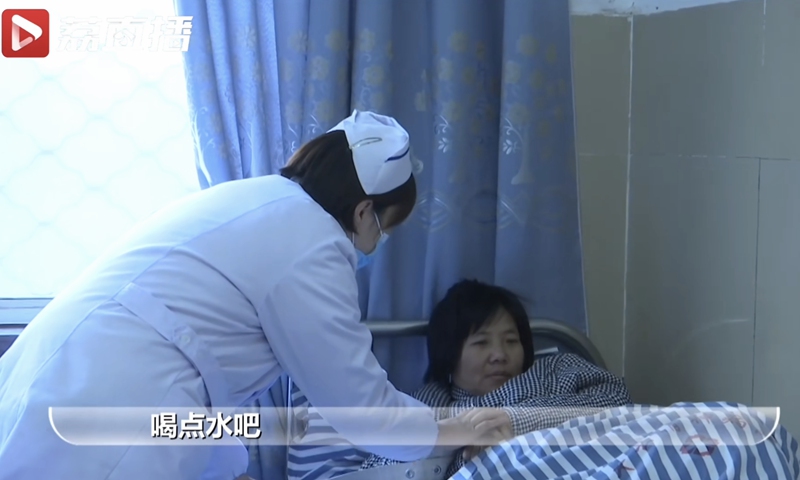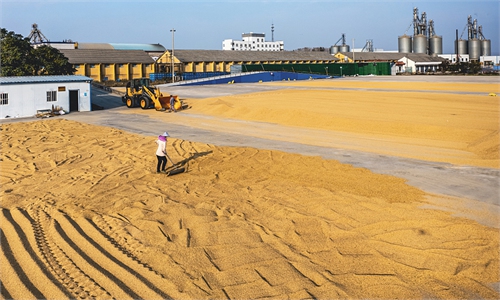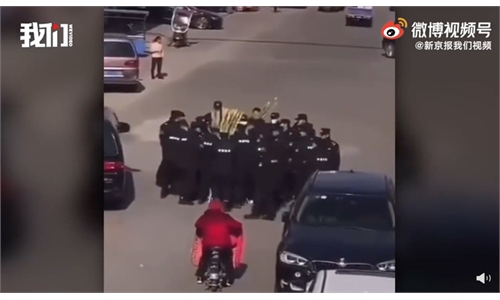17 officials punished in woman trafficking case in East China
Political advisor suggests nationwide trafficking survey, rescue campaign

The victim, a woman surnamed Yang, of a human trafficking case in Xuzhou, East China's Jiangsu Province, receives treatment in hospital. Photo: A screenshot from Sina Weibo
A total of 17 people have been punished or put under investigation in a high-profile case involving a woman suspected of being trafficked in Fengxian county, East China's Jiangsu Province, provincial authorities announced on Wednesday, while the Chinese central government vowed to enhance measures to protect women's rights.
Among them, Lou Hai, Party chief of Fengxian, has been removed from his post, and Zheng Chunwei, head of the county government, has been ordered to resign, according to a report issued by an investigation team of the Jiangsu Provincial Committee of the Communist Party of China and the provincial government of Jiangsu.
Lou and Zheng both said they had no knowledge of the issue previously. "As the head of local government, I feel so guilty. The feeling will haunt me the rest of my life," Lou was quoted as saying by the Xinhua News Agency.
The victim, surnamed Yang, whose childhood name was Xiao Huamei, was born in a village in Southwest China's Yunnan Province in 1977. She was allegedly trafficked and began living with a man surnamed Dong in Fengxian since June 1998.
Over the years, Xiao Huamei gave birth to eight children. She has been diagnosed with schizophrenia, a mental disease, and serious periodontitis. She is currently in a hospital receiving treatment, accompanied by local officials and her eldest son, according to the announcement of the investigation results.
Yang's underage children are being taken care of by a team organized by local authorities, the announcement noted.
Her husband, surnamed Dong, has been approved to be arrested on Tuesday on suspicion of abusing her. Dong has been accused of, since 2017, chaining and abusing Yang every time she had a seizure. Further investigation into his alleged purchase of the trafficked woman is ongoing.
A woman surnamed Sang and a man surnamed Shi were arrested on suspicion of abducting and trafficking women, according to the announcement.
Several others suspected of being involved in the trafficking case were also subjected to criminal coercive measures, it said.
The case revealed problems and loopholes at the grass-roots level in the province in terms of protecting women's and children's rights, and helping and caring for special groups, read the announcement.
The investigation was based on visits to 4,600 people and a review of more than 1,000 documents and other materials in Jiangsu, Yunnan and Central China's Henan.
The case showed that a few local Party members and officials do not put people first, and have serious problems of formalism and bureaucratism, the announcement said, noting that Jiangsu province has launched a special campaign to crack down on violations of the rights of women, children and people with mental issues or disabilities.
The case of Yang caught public attention in January as a video of her chained in a dilapidated hut wearing thin clothes in freezing winter in Fengxian county went viral on Chinese social media. It quickly sparked outrage, with many infuriated netizens demanding help for the woman and an investigation into the case.
The Wednesday investigation report came one day after the Chinese central government's annual "No.1 Document" was issued, which focuses on issues concerning safeguarding stability in China's vast villages, including cracking down on all violations of women's and children's personal rights.
It soon became a hot topic on Chinese social media platforms with many netizens calling for a comprehensive campaign against the problem of women trafficking in the country to prevent similar tragedies in the future.
Zhu Zhengfu, a member of the National Committee of the Chinese People's Political Consultative Conference, told the Global Times on Wednesday that he has submitted a proposal to the central government to crack down on the crime of trafficking and buying women and children, and he will also submit it as a proposal at the two sessions.
Zhu suggested that China should launch a comprehensive and all-round program to solve the problem of human trafficking that has been going on for years, and the most urgent thing is to immediately conduct a comprehensive survey and mapping of women and children who may be trafficked nationwide and rescue them.
He also suggested that women who have been trafficked should be given greater rights of self-defense and that resulting marriages should be considered invalid.
In an article published on the China Women's News on Tuesday, Qi Jianjian, a deputy research fellow at the Institute of Law, Chinese Academy of Social Sciences, called for a campaign to check for women trafficking cases in the country amid the controversial case in Xuzhou.
She suggested stricter punishments for those who buy people, as they would often rape the victims, force them to do hard labor, and kidnap and hurt their victims. She said that the idea that the buyers have less liability in human trafficking cases than the sellers is wrong.
Previously, Fengxian county and the higher Xuzhou city government released four statements, but failed to ease public concerns, as some netizens pointed out the statements were perfunctory and contradictory.
For example, a short statement that Fengxian county released on January 28 denied there were crimes of human trafficking involved in the case, but the only reason it provided for that conclusion is that Yang and her husband had registered their marriage in 1998.
Observers noted that, at the very beginning, the Fengxian county did not take the issue seriously and the determination to thoroughly investigate the issue and take it as an opportunity to uncover the human trafficking problem. Their perfunctory attitude was the reason why the public lost trust in their statement and three others, until the provincial investigation team provided a detailed report.
The Wednesday report acknowledged the dereliction of duty by related officials for releasing misinformation without serious confirmation and said that they had been punished accordingly.
The Wednesday report also responded to public concerns with details.
It said that after conducting DNA sequencing, checking household registration materials and visiting related people, the investigation team concluded that Yang was Xiao Huamei, who came from Yagu village in Fugong county in Southwest China's Yunnan Province.
Villagers in Yagu told the investigation team that Yang began show language and behavioral disorders in 1997 after her mother - who died in 2018 - experienced two divorces.
Yang was at first abducted from Yunnan to Donghai county, Jiangsu, in 1998 by Sang and Shi who sold her to a local man surnamed Xu for 5,000 yuan ($791.5). Sang and Shi were sentenced to jail terms of five and seven years for another human trafficking case in 2000.
After living with Xu for about four months, Yang went missing in May 1998. She was abducted again by other human traffickers and sold twice until she became Dong's wife in June 1998.
According to the report, Yang subsequently gave birth to eight children between 1999 and January 2020.
The report also revealed misconduct and violations in Yang's marriage registration. In 2000, local authorities violated the rules by registering Yang's marriage just based on the information her husband provided.
In 2011, when Yang gave birth to her second child in the hospital, her husband's father bought a fake identity card as the hospital required her identity card.
Abducting and trafficking women and children is a vicious crime that seriously damages people's personal rights and China has always been focused on cracking down on the crime. The Chinese people's courts would severely punish traffickers who abducted women and children, even sentence them to death. The buyers would also be seriously punished according to law, read a commentary on the China Court newspaper on Wednesday.
The Fengxian case warns us that we should never relax or make mistakes in combating women and children trafficking. The possibility of the crime may be 0.0001 percent, but once it happens, it ruins the lives of the victims, the commentary said.



